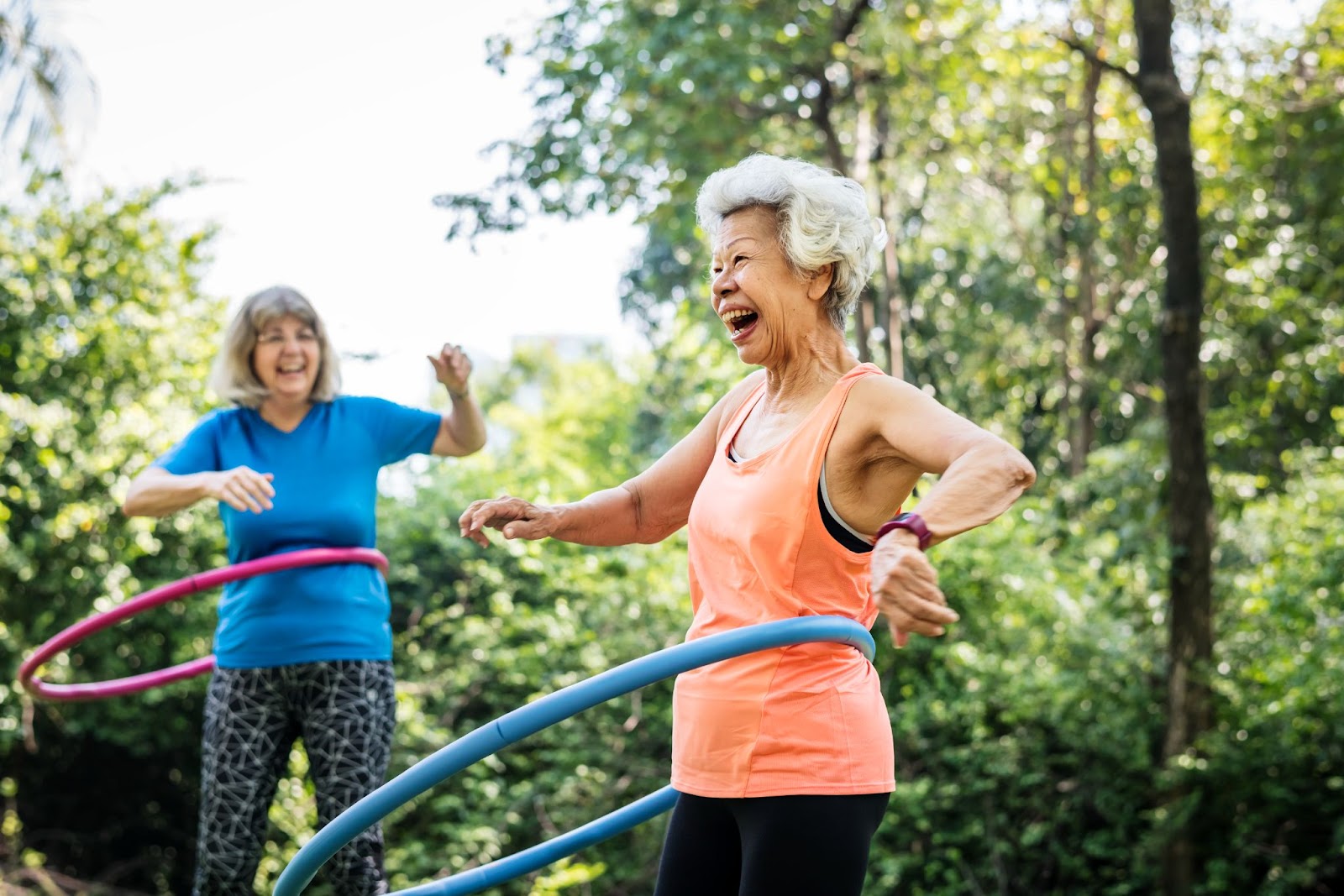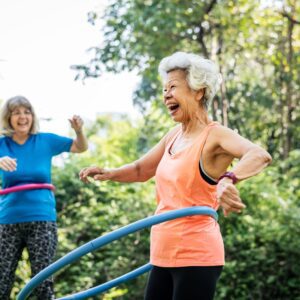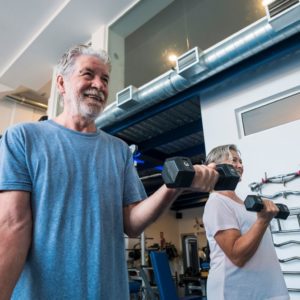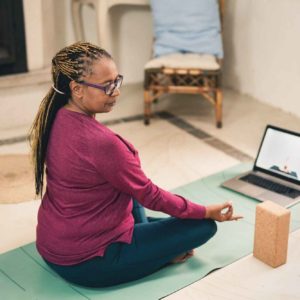
Aging well is like the art of sculpting. Just as a sculptor carefully shapes and molds a block of clay or stone, embracing wellness allows us to shape and mold our own well-being as we age. We chisel away unhealthy habits, refine our choices, and sculpt a healthy lifestyle that reflects our true essence. With each mindful decision and intentional action, we carve out a masterpiece of vitality, strength, and wisdom.
Just like a sculptor, seniors have the opportunity to shape their wellness habits and design a lifestyle centered around longevity. Leading a healthy lifestyle not only helps seniors stay active and vibrant but also enhances their overall quality of life. With a focus on wellness, seniors can experience a range of physical, mental, and emotional benefits. To understand the impact of wellness on seniors, let’s explore what wellness means, how it can help older folks live longer, and practical tips to help seniors embrace a healthier lifestyle every single day.
What Is Wellness?
Wellness is the holistic practice of nurturing our body and mind to create a fulfilling, balanced, healthy life. The concept of “wellness” can broadly be separated into two main categories: physical wellness and emotional wellness.
Physical Wellness
Physical wellness involves taking care of our bodies through nutrition, exercise, and adequate rest. For seniors, physical factors like strength, balance, and flexibility play a role in their ability to remain mobile, independent, healthy, and happy into their later years of life. Physical fitness becomes harder and harder to maintain as you age, so creating a daily physical wellness practice can help your body preserve functionality into your 70s, 80s, 90s, and beyond.
Here are some areas to focus on when crafting a daily physical wellness practice:
- Exercise daily. Seniors can participate in activities like walking, swimming, cycling, yoga, or strength training to engage muscles and improve heart health.
- Incorporate balance and flexibility. Maintaining balance and flexibility becomes increasingly important to prevent falls and maintain mobility as we age. Incorporate exercises that focus on balance and stretching, such as yoga or tai chi.
- Prioritize rest. Adequate sleep is vital for energy levels, cognitive function, and even immune system health. Get enough rest every day by creating a relaxing bedtime routine and practicing good sleep hygiene.
- Fuel your body (properly). Proper nutrition plays a key role in maintaining physical wellness. Focus on a daily balanced diet that includes a variety of fruits, vegetables, whole grains, lean proteins, and healthy fats.
Emotional Wellness
In addition to physical wellness, seniors should focus on creating and maintaining emotional wellness. Emotional wellness refers to nurturing our mental and emotional well-being. From managing stress and cultivating positive relationships to developing coping strategies for life’s challenges, emotional wellness sharpens your mind and grows your inner peace.
Emotional wellness for seniors includes attributes like:
- Having a positive mindset.
- Practicing mindfulness.
- Being adaptable.
- Having — and creating — long-lasting relationships.
- Participating in activities that bring you joy.
- Cultivating mental sharpness.
Aging is a physical and a mental process, which is why stress — or other mental blocks — can cause seniors to stumble on their journey towards wellness. By actively creating a daily wellness that includes physical and emotional activities, seniors can enjoy a vibrant, fulfilling, long-lasting life with a strong body and mind.
Why Is Wellness Important to Seniors?
Wellness has the power to help seniors maintain a high quality of life — and even prolong their golden years. As we age, our bodies naturally go through changes that can impact our health. The human mind naturally weakens over time and can fall prey to cognitive diseases like Alzheimers and dementia. Similarly, the body experiences a natural decline in functionality, strength, and balance that can lead to ailments, accidents, and injuries. The good news? There are prevention measures you can take to ward off illness, disease, and avoidable accidents (like falls) from happening to you. Research shows that prioritizing mental and physical wellness can add years to your life. In fact, new research reveals that regular exercise can lower the risk of functional limitation and disability by up to 50%. Taking an active approach to aging well can help you live longer — and healthier — for years to come.
One of the best ways to introduce wellness into your life as a senior is by incorporating physical and mental wellness activities into your daily routine. Start by establishing a structured daily routine that includes exercise, healthy eating, relaxation, and social engagement. A routine can help seniors stay consistent with their wellness activities. Remember to take small first steps and gradually increase duration and intensity over time. For example, implement small dietary changes — like adding more fruit and vegetables to your meals — and ramping up as the weeks and months go by. By starting small, seniors can make lasting changes without feeling overwhelmed.
5 Wellness Tips for Seniors
You may have heard the old adage: an ounce of prevention is worth more than a pound of cure. Well, the same line of thinking applies to seniors looking to maintain their mental and physical health well into the later years of their life. To prevent declining health, seniors can prioritize the following daily wellness tips.
1. Prioritize Nutrition
Nutrition should not be overlooked when it comes to holistic wellness. As you age, it’s important to focus on several elements of your diet: caloric intake, nutrient density, hydration, fiber-rich foods, and calcium intake, among many others. Take a moment and ask yourself the following questions. Are you eating a well-balanced meal? Are you eating enough protein? Are you drinking enough water throughout the day? By prioritizing balanced meals, considering nutrient density, staying hydrated, focusing on bone health, incorporating fiber and protein, and considering individual needs and health conditions, seniors can create a nutritious diet that supports their overall well-being and helps maintain optimal health as they age.
2. Aim for 7-8 Hours of Sleep a Night
As you age, your sleeping patterns may change. You may notice that you have a harder time going to sleep or that you’re waking up more often and interrupting your REM sleep cycle. Unfortunately, sleep deprivation is a common issue for older adults, so it’s important to make a plan for getting 7-8 hours of sleep every night. First, evaluate what you eat before bedtime and eliminate caffeine, sugar, or alcohol. Are there any medications you’re taking that could be interfering with your sleep cycle? If so, talk with your doctor about any adjustments that can be made. Then, develop a wind-down routine to regulate your body and help your brain realize it’s time to start shutting down for the evening. Turn off screens and try finding sleep aids that work for you, such as a noise machine or essential oil room spray. Finally, get in bed at the same time so you can wake up feeling refreshed and ready for the day.
3. Get Moving
Aim to move your body every single day. Incorporating daily movement can help you maintain strength, flexibility, and cardiovascular health. According to the Centers for Disease Control and Prevention, older adults should aim to get 150 minutes per week of exercise — or 30 minutes per day, five days per week. Not only does exercise help keep your body in working order, it also provides clarity of mind and boosts your mood.
Here are some easy ways to incorporate movement into your daily schedule:
- Walk with a friend. Add some socializing to your schedule while you exercise! Go for a daily walk with a friend to move your bodies and catch up.
- Stretch. Maintain — and improve — mobility by stretching and working on your flexibility.
- Participate in water aerobics. This type of exercise is one of the lowest-impact kinds of movement you can do. Get in the pool and work on your cardiovascular fitness, strength, and flexibility.
- Dance. Dancing is another wonderful way to add movement, enjoyment, and coordination to your routine. It’s also a great opportunity to socialize with friends if you choose to participate in a dance class.
4. Do Something for Your Mind
Exercising your brain is just as important as exercising your body. To prevent cognitive decline, older adults need to proactively keep their mind sharp by engaging in mentally stimulating activities that enhance memory, concentration, and problem-solving skills. Here are a few ways to keep your mind sharp:
- Puzzles and brain games: Work on crossword puzzles, Sudoku, word searches, jigsaw puzzles, or brain teasers to challenge your brain. These critical thinking skills can help keep your memory in good shape.
- Reading: Whether you love reading fiction or the newspaper, reading provides a level of mental stimulation that engages your vocabulary skills, comprehension, and imagination.
- Learning a new hobby: Painting, knitting, woodworking, playing a musical instrument, learning a foreign language… the sky’s the limit when it comes to taking on a new hobby. Lean into an activity you’ve always wanted to learn to exercise cognitive flexibility.
- Meditation and mindfulness practices: Engaging in meditation can improve focus, reduce stress, and promote mental clarity. Plus, this relaxing practice is beneficial to your overall emotional well-being.
- Board games and card games: Not only are games like Scrabble, chess, and Rummy enjoyable, but they’re also great for your mind. These mentally stimulating strategy games involve problem-solving, critical thinking, and memory skills.
5. Find Your Community
Finally, one of the most important aspects of physical and mental wellness includes creating and maintaining strong connections with others. Socialization is a critical aspect for seniors that contributes to their overall wellness. Being part of a community can provide emotional support and, more importantly, it reduces feelings of isolation. Lean into opportunities that allow you to connect with others who share your interests. Join clubs, volunteer, seek out activities at community centers to engage in social activities.
Health and Wellness for Seniors: Key Takeaways
As you become the sculptor of your life, take the time to carefully shape and mold your well-being. By prioritizing physical and emotional wellness, seniors can experience a range of benefits that enhance their overall quality of life. Incorporating daily activities such as exercise, proper nutrition, adequate sleep, cognitive stimulation, and social engagement is key to maintaining a healthy lifestyle. Wellness is not just about adding years to life but also about adding life to years. Take proactive steps towards wellness and you can carve out a masterpiece of vitality, strength, and wisdom, enjoying a vibrant and fulfilling journey through their golden years. Retirement Genius is here to help you embrace the power of wellness and shape your life into the vibrant masterpiece it can be.










